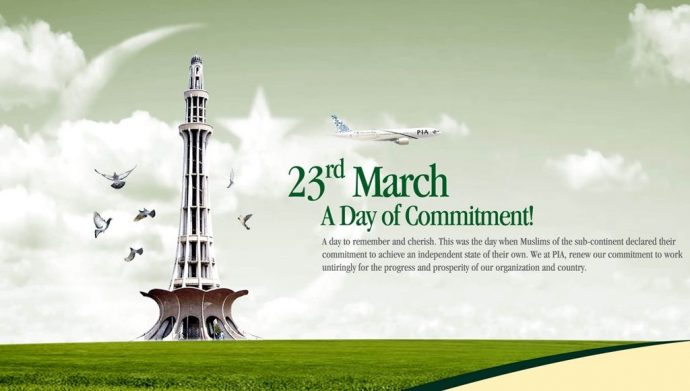
March 23rd: A momentous day that honours Muslims’ valiant fight for Pakistan
The Muslims, who ruled the subcontinent of Indo-Pakistan for nearly 800 years, faced unending inequality, discrimination, and disparities during that dark and oppressive period. The colonial masters saw them as their arch rivals following the defeat of the War of Independence in 1857, and they drove them to the edge.
After overthrowing the last Mughal ruler, Bahadar Shah Zafar, the colonial masters used the East India Company to seize power and deprived Muslims of all political, economic, and human rights and liberties. They then shifted their focus to the socioeconomic, political, and educational empowerment of the Hindu population. After Muslims had virtually no access to government employment, education, or the civil and military services, this enormous injustice has exacerbated their intellectual, political, and educational decline.
Following the inspirational teachings of the great religious leaders, Mojadad Alf Sani and Shah Waliullah, Sir Syed Ahmed Khan, a renowned educationist and political thinker, instilled a new hope, direction, and dynamism among the oppressed Muslims, giving them a new lease on life during that period of darkness and oppression.
Through his educational, political, and social reforms, Sir Syed Ahmed Khan not only helped the Muslims of British India reclaim their former glory but also neutralised the malicious propaganda of the colonial rulers and Hindus against pessimistic forces. He also brought about an intellectual revolution among the Muslims.
Established by Sir Syed in 1886, the All India Muhammadan Educational Conference (AIMEC) in Aligarh provided Muslims with contemporary education, socioeconomic advancement, and political cohesion, enabling them to gain ground during that period of animosity and gloom.
Millions of Muslims were soon able to compete with other communities, including Hindus, thanks to the network of educational institutions, political unity, and social cohesion under AIMEC. It also served as a springboard for Muslims to begin a nonviolent, democratic political and homeland struggle in the subcontinent.
Muhammad Youas Khan, Chairman of the Political Science Department at Islamia College Peshawar, told APP that Sir Syed’s goal-oriented multisectoral reforms, which gave Muslims superiority in the social, economic, and political sciences, had broken the British-Hindu tie. As a result, Muslims’ voices were heard.
He said that the All India Muslim League’s (AIML) founding in Dhaka on December 30, 1906, had brought Muslims together by revitalising the Pakistani independence struggle. “The great poet-philosopher Dr. Allama Muhammad Iqbal’s outline of an independent state for Muslim majority provinces in North Western India during his historic Allahabad address in 1930 gave the freedom movement even more impetus after Quaid-i-Azam Muhammad Ali Jinnah led it after formally joining AIML in 1913.
Thus, the two-nation theory—that Muslims were a separate country and should have political independence from other areas and communities of the undivided India—was first articulated by Dr. Allama Muhammad Iqbal, a politician. He stated, “The Pakistan movement had gone through several stages before taking on its current form in 1933 at a high-level meeting in London where Chaudhary Rehmat Ali announced the name of Pakistan.”
He mentioned the two former students, Aslam Khattak and Inayatullah Khan of Charsadda, together with other Muslim leaders, who supported the name Pakistan, recalling Rehmat Ali’s famous adage, “now or never or perish forever.” “The name Pakistan and the historic speech given in Allahabad had given the Muslims a clear direction to achieve Pakistan.”
Millions of Muslims gathered at Lahore’s Iqbal Park on March 23, 1940, under the inspiring leadership of Quaid-i-Azam Muhammad Ali Jinnah, and they passed the momentous Pakistan Resolution. Quaid-i-Azam reorganised AIML on contemporary lines after the Pakistan Resolution was adopted, and he frequently travelled to all provinces with a majority of Muslims, including KP (formerly known as the NWFP), in an effort to inspire support for Pakistan.

Content writer, educationist, teacher, researcher, social media manager, and a SEO manager from lahore. She has been working as a freelance academic and non-academic writer for more than 10 years now. She has a passion to learn new things and has a knack for writing and she combines both things to produce write ups she pours her heart out in.

